Midnight Zone: a Cade Rearden Thriller Read online
By
JK Franks
This book is a work of fiction. The characters, incidents, and dialogues are products of the author’s imagination and are not to be construed as real. Any resemblance to actual events or persons, living or dead, is entirely coincidental.
Midnight Zone
Copyright © 2020 by JK Franks
All rights reserved. With the exception of excerpts for review purposes, no part of this book may be reproduced or transmitted in any form or by any means, electronic or mechanical, including photocopying, recording, or by any information storage and retrieval system.
Editor: Debra Riggle
Cover Design: Tom Edwards
eBook ISBN: 978-1-7326144-6-8
Paperback ISBN: 978-1-7326144-7-5
Hard Cover ISBN: 978-1-7326144-8-2
Email the author at [email protected]
Friend him on Facebook at
facebook.com/groups/JKFranks
Visit the author’s website at www.jkfranks.com
A portion of the profits of this book are going to support the following marine charities: Ocean Conservancy (oceanconservancy.org) and Oceana (oceana.org).
First Edition
v. 2020-0629
This book is dedicated to O’Ryan. Thanks for all your love and support and no, you don’t get a cut of the royalties.
“Beware that, when fighting monsters, you yourself do not become a monster...for when you gaze long into the abyss, the abyss gazes also into you.”
Friedrich W. Nietzsche
Mediterranean
1155 Hours, June 7, 1967
The ship slipped quietly through the black Mediterranean waters. The two Cleveland diesel engines were capable of 500 horsepower, but the captain was not interested in speed this night. At a mere 177 feet long, it barely registered as a ship of war. In fact, the only weapon it carried was a twin .50-caliber machine gun mounted amidships, just under the bridge. The USS Liberty was a light duty vessel based on the Victory ships of WWII. Officially, it was an Environmental Research Ship, but everyone aboard knew it for what it really was, a signals intelligence gathering vessel. Instead of weapons, the top of the squat, somewhat ugly ship bristled with antennae masts, multiple receiving arrays, and more even less identifiable equipment.
The few lights from Rafah, Egypt, could be seen about eight miles away as they passed to the north. The nearly invisible port of Ashdod would be just inland off their starboard side. Ahead, the sky shone a faint, telltale yellow as Tel Aviv was just coming into view. The captain ordered the Liberty to cut speed as they cruised to within five miles of the coast. Most of the two hundred-man crew were asleep in their billets or at duty stations below deck. The bridge crew tonight was mostly senior officers. Two armed sentries patrolled the ship and acted as lookouts. These were dangerous waters, possibly only slightly less so than the area five thousand miles away near Vietnam.
Two weeks ago, the Liberty had been stationed off the Ivory Coast before a quick port call in Spain where they picked up three new people and an assortment of odd-looking cargo cases. They had made top speed to the current location. Captain McGonagle was a thorough leader and a capable officer with more than twenty years’ experience. The mission tonight was relatively routine; it required them to be at the rendezvous point at the precise time.
The skipper checked his watch, then eyed the charts laid out on the table. He’d crewed in these waters before, but the eastern Med was new to most of his men. Although captain of the Liberty for just over a year, he ran a tight ship and trusted his officers to carry out commands with haste. He would have liked to have fully briefed them all, but he had his orders. Naval intelligence oversaw this mission.
A call came from one of the sentries up near the bow, “Reports of an explosion and gunfire just south of the city, Captain.” Tensions were sky high here, but McGonagle and his crew were safely outside any areas of risk. That did not necessarily mean they were welcome. America was never completely welcomed in another country’s back yard.
“Thanks, Chief,” he answered, still checking the time. Eight minutes later, the captain eased up to the helmsman and quietly ordered, “Full stop.” The sound of the engineer bringing the engines to idle sent a brief shudder through the boat.
“Sentry reports small craft in the water approaching fast, Captain. Should we man the guns?”
“Negative, Lieutenant. Recall both sentries.” Turning to a man standing in the rear of the room, he nodded. “Mister White, you’re with me.” The two officers walked briskly out the door to the aft section of the ship, leaving a bewildered senior staff on the bridge.
Hours later, the sun-baked coastline shimmered in the distance as the two men talked. “Hell, Adams, I don’t know. She ain’t making any sense, you know. Talking about free love and why we shouldn’t be bombing Cambodia and shit.”
The other man made a sound, maybe a laugh. He kept working the handle on the grease gun.
“I swear to God I ain’t making this shit up. The same woman who has no idea where the fuck Vietnam is, now has an opinion on why we shouldn’t be in that war. Now she thinks we are just out here having the time of our lives cruising around the Mediterranean.” A pair of fighter jets flew low overhead, surprising them both. The aircraft veered away just past the ship, heading south toward Gaza. The sound of the passing jets arrived several seconds later.
“Those ours?” Pete asked, holding his hand up to shield his eyes from the morning sun.
Adams stood up, shrugged, and wiped the grease from his gigantic hands with a rag, then used the same rag to wipe sweat from his forehead. “I don’t know, our carriers are a few hundred miles away, I think.” The Liberty was loosely assigned to the Saratoga’s carrier group. The America was also stationed nearby, supposedly. The commitment to Israel was, if they were attacked, to be able to provide air cover within fifteen minutes.
The men moved to the next in a long series of grease fittings along the boat’s mechanical equipment. The saltwater and ocean air meant that maintenance was almost non-stop. The sailors aboard all knew they would likely never be involved in an actual battle. Like its sister ship, the Pueblo, the Liberty was assigned to hotspots around the globe simply to monitor growing escalations.
The situation here in the eastern Mediterranean definitely qualified. It was a powder keg, and everyone knew it. While the United States as a whole was focused on Vietnam, a divided nation with admittedly little direct domestic impact, tensions here had been growing heated between Israel, one of the country’s top allies, and an Arab coalition that included every one of its neighboring countries.
“Nasser seems hell bent to wipe out the Jews. That’s what my pops says,” Adams said.
“Who the fuck cares? Hitler tried—he failed. Besides, whose idea was it to just give them a country right smack dab in the middle of all these Arabs?” He said it like two words, A-rabs.
A claxon sounded from high overhead. “What the fuck?” both men seemed to say at once. The two jets had returned, circling the ship several times before leaving. None of them had any markings. “They damn sure look like ours,” Adams said.
“So why are we going on alert?” the other man asked, buttoning up his tools and stowing them out of the way. He noticed other sailors rushing to uncover the twin guns, and uncrating ammo belts. Over the next several hours, various planes came and circled the ship. The American flag and U.S. Navy markings were clearly visible on this ship. They heard from the bridge crew the skipper had requested a destroyer escort or permission to evade. The USS Liberty maintained its patrol now off El Arish, Egypt.
Even before the battle stations was eventually sounded, t
he two friends had already taken up positions in different parts of the ship. Adams was topside, assigned to fire control, and Pete’s assignment was additional security outside the massive radio room.
“Multiple small craft approaching from the port!” a sentry yelled from atop the bridge. Adams felt his insides go watery. This damn sure was beginning to feel like the real thing...like battle. The port would have been Israel, though, Ashdod probably. That was good.
Two unmarked delta-winged Mirage jets reappeared; this time they were not circling, but lining up for a firing run. From his position, Adams couldn’t see what was coming, but heard the panicked shouting. The fire control suit he wore was heavily lined, and he was baking in the midday heat. The twin guns opened up on something just before incoming missiles took out the gun mounts, followed by explosions near the ship’s antennae and bridge.
Six minutes later, three other unmarked jets attacked with a menacing combination of napalm and rockets.
McGonagle franticly had his radioman attempt to contact Sixth Fleet, but the radio room report circuits were jammed. The air attack lasted twenty-two minutes. The badly damaged Liberty was burning and had already lost nine men with another sixty seriously wounded. Adams lay half in a hatchway beneath the bridge. Singed flesh covered one arm; the other was completely gone. Blackened bits of meat and bone and dried blood covered the right side of his body. The entrance to the radio room twenty yards away was now just a gaping black hole billowing toxic smoke. Adams was fighting to keep the darkness away, unable to even wonder about his friend as the attack finally subsided.
Torpedo’s in the water!” Consciousness was leaving him as he heard someone screaming, “Why would they do this?”
Why indeed? he wondered. He’d seen markings on the last wave of attacking jets, the five-pointed symbol more commonly referred to as the Star of David. Goodbye, Pete, he thought as his eyes closed one final time.
2
Caribbean – Present Day
He heard them long before he saw them. Glancing up, he saw tiny brown legs running through the marsh grasses.
“Doktè, you must come.”
He didn’t want to move; he was comfortable, and it was his day off from the health clinic. How in the hell had the little ones even found him? He pulled the brim of the hat even lower and closed his eyes, willing them to respect an old man’s siesta. It was not to be.
Several little hands shook him as they pleaded, “Doktè, please, we found something. You must come now.”
He tried in vain to ignore the little ones, but he knew it was futile. Whatever curiosity had their attention, it now enveloped him as well. Rising unsteadily and packing away his fishing pole, he allowed himself to be led toward the nearby beach.
“Come, come…you see dair,” they urged.
He recognized only one of the children but was nearly certain he had helped deliver them all. Many of the parents still refused to bring their offspring into the clinic for anything except the direst of situations. “Ricardo,” he called out to the one he knew. “What are you going on about?”
The boy just grinned and nodded, pulling him steadily to the water. He could see through the grasses a small group gathered on the beach. In a few steps more, the stench hit him. The smell of rot and decay was a constant in the tiny village, but this was far worse. He removed a tattered handkerchief from his pocket and held it to his nose, his steps slowing as he drew closer to the group. Probably a beached dolphin, maybe even a small whale, although it would be early for one of those to be near the island.
Murmurs of concern echoed through the small group as he politely eased his way in.
“You see, you see now, Doktè?”
He heard Riccardo’s tiny voice as he broke into the inner line. His eyes stared at what lay in the sand. It was definitely not anything he’d expected. Easing around to what obviously had been the head, he gasped in disbelief. “No, no…no. This cannot be.”
Several hundred miles away, Kissa watched as his girlfriend glided through the crystal-clear Caribbean waters. Thera was a natural; her swimming was a rhythmic ballet, whereas his own was more often described as creative drowning. Where she glided, he fought the water like a warrior. At the end of the hour, she would be rejuvenated, energized, and ready for the rest of the day. He, on the other hand, would be winded and exhausted from the exertion.
Both of them were from the tiny town of Ampala on Isla El Tigre in the Honduran Gulf of Fonseca. Today's dive trip to the nearby island of Guanaja was to monitor several of the large whale sharks recently spotted in the area. He loved being an oceanographer, almost as much as he loved Thera, but recognized his inadequacies in both specialities.
Climbing back aboard the small boat, Kissa waited for her to resurface. The water was clear enough to see her silhouette thirty feet below as he lay back against the hull and let his eyes drift closed. He could trace her line of bubbles. Thera was no scientist but had a love of nature, and the ocean in particular, that easily equaled his own. This part of the Caribbean was known as the Miskito Coast, named after the indigenous Miskito Indians who settled here. While once the coast was considered inhospitable, development was starting to creep in. Here on Guanaja, that would take a while, as over ninety percent of the land and surrounding waters was protected as part of the 450-mile Mesoamericana Barrier Reef system, the second largest in the world. All development was tightly controlled, unless you knew who to bribe of course.
“I will get your certification revoked,” she said as her head broke the surface. “Never leave your dive partner—right?”
He grinned and nodded, eyes still closed, feigning sleep. “I’m tired, woman,” he said in a deliberate tone perfectly pitched to set her on edge.
“Woman? Woman?” she yelled just before splashing him with sea water.
“Come on, get out, girl. We still hopping the ferry to Utila tonight?”
She ignored the question but was leaning over the gunnels rummaging around in her gear bag. “Come back down with me, something I want to check out, but I need my lights.”
“I’m tired, Thera, I’m not as young as you.”
“Come on, we’re both twenty-nine, Kissa. It's near the bottom, you know the rules.”
Bottom depth here ranged from thirty to sixty feet, but neither ever went that low unaccompanied. Good dive discipline had been drummed into them both since being open water certified in their late teens. The difference was, Thera had gone on to become a dive instructor and then an adventure dive guide among her other accomplishments. Today, off in the calm, relatively shallow water was not even a test of her skills, but still, no one went to the bottom alone.
“We already down to our spares,” he said pointing to the tanks strapped together in the boat's bow.
Thera was already removing her nearly empty tank. “Come on, Kissa, it won’t take long. Something is down there. I still have thirty minutes on my tank.”
He took his regulator off the almost empty tank and strapped it onto one of the spare bottles. Screwing on the hoses, he looked at Thera again. She was incredibly beautiful, and he was powerless to refuse her request. Quickly checking the low-pressure connection and then the pressure gauge, he took a couple of test breaths before fastening the rig on his back and rolling backward into the water.
Kissa watched as she hung in the water twenty feet below, impatiently waiting for him. He angled down, adjusting his buoyancy compensator as he dove. The surface water was crystal clear, but he could see below was murkier. Sweeping his head from side to side, he didn’t understand what his girlfriend could have spotted. Several small coral outcroppings and related bottom structure dotted the landscape and the normal assortment of parrotfish and black grouper, but nothing they had not seen for most of the morning. Following her down even farther, the natural light faded. When she finally cut the spotlights on, he suddenly saw what had Thera’s attention.
The bottom structure in this part of the Caribbean was normally rather boring.
The relatively shallow water and regular storms made it difficult for more substantial plant life. There were few rocky outcroppings nearby except around the more volcanic island. Occasional outcroppings of coral reefs and the occasional wreckage of small craft was about all there was to see. To be honest, despite the gorgeous, crystal blue water, it was somewhat mundane even to an oceanographer like him. Other than to spot the whale sharks that congregated here, neither of them would have deliberately chosen this particular area.
Thera was about forty yards ahead and seemed to be circling an oddly colored mass he took to be some sort of sea grass. He assumed it was another patch of dead sargassum. Actually, a type of algae instead of a true seaweed. The brown mats were common all over the Caribbean, often clumping together into large floating mats. Over time, these mats inevitably would wash up onto beaches where they were despised. The sight and the smell kept tourists away, and so most coastal villages had eradication methods working constantly during heavy blooms. No one was exactly sure of the cause. Kissa himself had worked on several projects investigating it. He believed it was a combination of global warming and increased fertilizer runoff from the large commercial farms inland.
His girlfriend, however, wouldn’t normally be interested in something that mundane. Her own field of expertise didn’t focus very heavily on plant life. Still, she was intensely interested in the patch of seafloor ahead. Her powerful dive lights cast a yellow circle of illumination. What he had taken for rippling grass was beginning to seem like something else. Like the pattern was on the object itself. He wished again their department budgets could have sprung the extra money for the dive gear with wireless comms. As it was, they had to rely mainly on hand signals to communicate underwater.

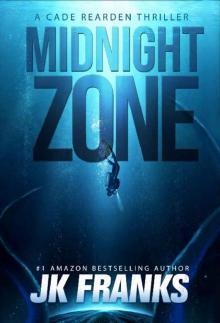 Midnight Zone: a Cade Rearden Thriller
Midnight Zone: a Cade Rearden Thriller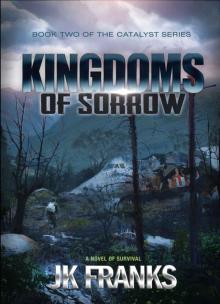 Kingdoms of Sorrow
Kingdoms of Sorrow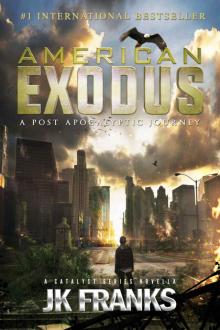 American Exodus
American Exodus Catalyst
Catalyst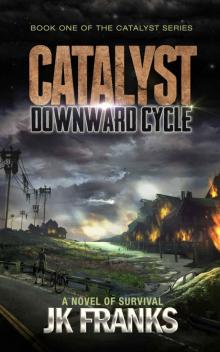 Downward Cycle
Downward Cycle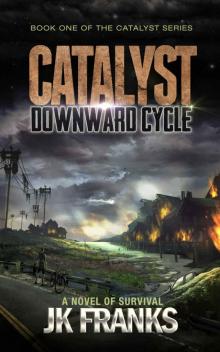 Catalyst (Book 1): Downward Cycle
Catalyst (Book 1): Downward Cycle